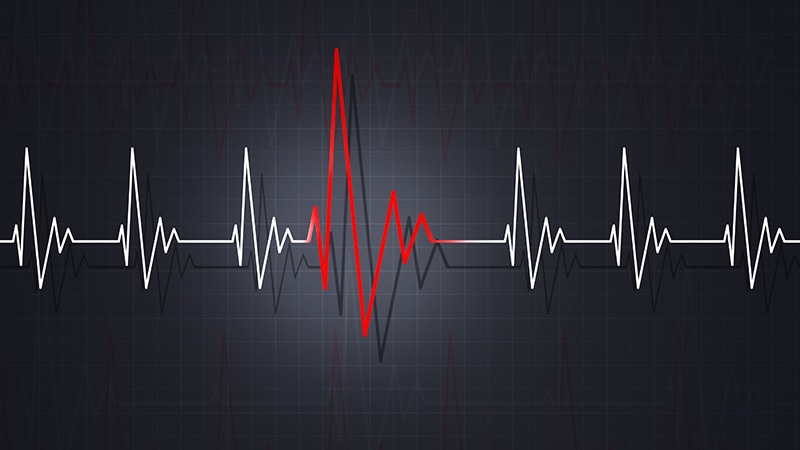Cardiac Arrhythmia Should Be Considered With Nocturnal Enuresis
Physicians doing a diagnostic workup for nocturnal enuresis, or bedwetting, appear to rarely consider cardiac arrhythmia as a differential diagnosis, new research suggests.
Researchers surveyed doctors about how they would approach assessment of a case of nocturnal enuresis, and only 1% reported they would order an electrocardiogram (ECG).
The findings suggest that doctors should consider cardiac arrhythmias as part of the diagnostic workup for patients presenting with enuresis nocturna, report Sami Viskin, MD, Tel Aviv Sourasky Medical Center, Israel, and colleagues.
The findings were published online April 6 in the journal Heart Rhythm.
The study was prompted by the death of a young woman who died suddenly in her sleep having sporadic incidents of enuresis nocturna, Viskin said in an email to theheart.org | Medscape Cardiology.
“Unfortunately, we got involved with the case too late, only after the girl died. The mother came to us seeking advice concerning the risks for additional family members. The point is that the minute the mother told us the story of the deceased daughter, it was clear to us, as arrhythmia specialists, that an arrhythmogenic disease, with long QT syndrome (LQTS) high on the list of candidate diseases, was responsible for the enuresis and eventual death during sleep,” Viskin said.
“We think that any arrhythmia specialist would think about the possibility of arrhythmias if consulted by a case like ours. The problem is that patients are not likely to consult cardiologists when enuresis nocturna is the only symptom,” Viskin added. “It is therefore important to raise awareness among primary physicians, the doctors who are likely to encounter cases like this one, about the possibility of cardiac arrhythmias as part of the differential diagnosis of enuresis.”
There is not much research concerning bedwetting and arrhythmias, noted Jonathan R. Skinner, MBChB, MD, Heart Centre for Children, Sydney Children’s Hospital, and Patrina H.Y. Caldwell, FRACP, PhD, University of Sydney and Children’s Hospital at Westmead, Sydney, New South Wales, Australia, in an editorial accompanying the publication.
“There have only been 4 case reports in the literature of people presenting with new-onset bedwetting and cardiac arrhythmias,” Caldwell told theheart.org | Medscape Cardiology.
“When patients present with new-onset enuresis — doctors should take a history to assess the likelihood that the enuresis is caused by an arrhythmia,” Caldwell noted. “One important aspect of the history taking is to enquire about a family history of sudden, unexplained deaths, as well as asking about general cardiac symptoms. If there is a possibility of arrhythmias, doctors should do an ECG.”
Survey respondents included 37 interns, 35 residents, 102 pediatricians, 57 internal medicine specialists, 42 advanced medical students, and 73 family physicians. About 33% of the respondents had more than 3 years of work experience and were classified as more senior-level medical providers.
The research team used Survey Monkey to complete an anonymous online questionnaire. They emailed the link to internal medicine physicians, pediatricians, and family physicians through their respective medical professional societies.
Respondents were asked which diagnostic assessment they would perform on a 20-year-old asymptomatic female who had two incidents of bedwetting 2 years apart. The survey consisted of 18 questions addressing potential diagnostic workup options, including imaging tests, blood work, oral glucose tolerance test, electroencephalogram, electrocardiogram, and more, for this scenario.
Results showed that the majority of respondents said they would order a kidney ultrasound and urinalysis when encountering a patient with enuresis to identify a potential urinary disease.
Physicians also noted that they would look for abnormalities in urinary flow and diabetes.
Notably, only 1% of respondents considered doing an ECG, and 19% would perform an encephalogram to look for nocturnal epileptic seizures.
“This suggests that additional surveys, involving a much larger sample of similar physicians, likely would demonstrate that physicians do not generally consider arrhythmogenic syncope during the differential diagnosis of bedwetting. We believe that these results are representative of physicians’ conceptions worldwide,” write Viskin and colleagues.
They also noted that pediatric, family medicine, and internal medicine textbooks and guidelines did not support performing an electrocardiogram when assessing a patient for bedwetting.
Given that the medical community does not know how common this presentation is, future efforts should “review how many patients with conditions like LQTS and Brugada syndrome suffer secondary enuresis,” Caldwell concluded.
Heart Rhythm 2022; Published online April 7, 2022. Full Text. Editorial.
Viskin and Caldwell report no relevant financial relationships.
Ashley Lyles is an award-winning medical journalist. She is a graduate of New York University’s Science, Health, and Environmental Reporting Program. Previously, she studied professional writing at Michigan State University, where she also took premedical classes. Her work has taken her to Honduras, Cambodia, France, and Ghana and has appeared in outlets like The New York Times Daily 360, PBS NewsHour, The Huffington Post, Undark, The Root, Psychology Today, Insider, and Tonic (Health by Vice), among other publications.
Source: Read Full Article
